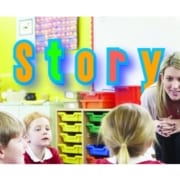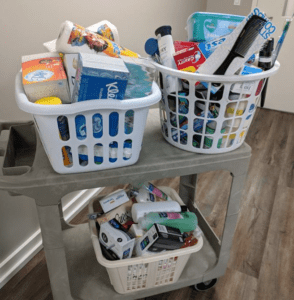Happy Healthy with Hadlee: Coping During Coronavirus
Earlier this month, we hosted a Zoom Class focused on health and wellness during the COVID-19 pandemic. We were joined by Health and Lifestyle Change Coach Hadlee Garrison – she had a ton of helpful information to share.
Here are some of Hadlee’s suggestions that we found to be most helpful during this difficult time.
Michigan Mortgage: Thanks for joining us (again)! For those that missed our Zoom Class, can you tell us about the importance of health and wellness during this difficult time?
 H: It’s so important right now to implement healthy routines each day in order to feel purposeful and have the structure to feel less stressed and more grounded. Otherwise our days seem to blur together and it can feel like we’re just trying to keep our heads above water. And that doesn’t even include all the other ways healthy routines can positively impact our physical and mental health during this time!
H: It’s so important right now to implement healthy routines each day in order to feel purposeful and have the structure to feel less stressed and more grounded. Otherwise our days seem to blur together and it can feel like we’re just trying to keep our heads above water. And that doesn’t even include all the other ways healthy routines can positively impact our physical and mental health during this time!
So many emotions are likely to arise right now. There are things we can do in the moment to cope with difficult emotions, and there are things we can do preemptively to build resilience so we can cope with future emotions in a healthy and fulfilling way.
MM: During our class, you mentioned the “RAIN” technique. Can you explain that a little bit?
H: In the moment, we can practice acknowledging and working through our emotions through a concept called RAIN, which stands for Recognize, Allow, Investigate, and Non-Identification.
- Recognize: Turn toward your emotions with acceptance. Identify the emotion arising and acknowledge the physical sensation that accompanies it.
- Allow: Allow the experience to be there just as it is. Accept that the emotion is there without denying it. Recognize that emotions are impermanent, and that even if it feels overwhelming in the moment, it will soon pass.
- Investigate: Get compassionately curious with your emotions. You can ask yourself: ‘What triggered this emotion? Why do I feel this way right now?’
- Non-identification: Practice non-identification, remembering that you’re not your thoughts, feelings, or emotions. You might be having a thought, feeling, or emotion, but you are not it. You are the observer of whatever is going on in your brain. Allow that to provide some relief.
MM: Thank you! I really think people can benefit from using that technique.
You are a wealth of knowledge, and I know we could go on for hours about this, but before we go, can you share a few health habits people can establish right now?
H: For being more mentally and physically resilient to stressors and viruses right now, we can practice tangible health habits. I suggest only choosing a few so as to not overwhelm yourself during this potentially stressful time, and sticking to those things consistently.
- Pay attention to how your body feels: If you’re not aware of how your body feels, it’s hard to give it what it needs. Take time to feel your physical sensations: hunger, satiation, thirst, temperature, emotions, etc.
- Sleep: Get enough high-quality sleep. You can’t make optimal decisions when you’re sleep deprived, and your brain will always work better when you’re well-rested. This is the most beneficial thing you can do for anxiety AND immunity!
- Move: Being intentional about moving your body is now more important than ever, as we might be doing a lot less of it by default. Intermittent movement throughout your day helps improve both physical and mental health, as addressed below.
- Nourish your body: Stick to foods that nourish your physical and mental health: namely vegetables, fruit, and other whole, unprocessed foods. Decrease consumption of processed and refined foods, alcohol, caffeine, etc., and drink enough water! Food can be a challenge during Shelter in Place. While it’s helpful to have nutrition knowledge and guidelines around how our bodies use food optimally, listen to your own body. Tap into hunger/ satiation cues to feed yourself well, and notice how different foods make you feel to empower future decision-making.
- Breathe: Breathing seems like a given, but did you know that you can use your breath to actually alleviate anxiety? Try extending your exhale longer than your inhale for an immediate decrease in cortisol, the stress hormone.
- Ground down with nature: Connecting with nature is medicine against anxiety and fear. Try walking in the woods or exploring your backyard. If you can’t leave your house, look outside your window or grow a potted plant.
- Schedule screen time: Put away the devices for designated periods of time each day, including consuming the news. You can still set aside time to get informed each day, but being constantly inundated with information about coronavirus isn’t helpful for your mental, physical, or emotional health.
- Connect: Just because we’re physically distant doesn’t mean we have to be socially distant too! It’s important to be intentional about our social interactions right now. Video chatting, phone calls, and good old-fashioned letter writing can be incredibly refreshing and invigorating.
- Help: The fastest path to feeling a sense of purpose? Helping another person!
- Leave some space: Give yourself enough space in your day/schedule. Even in quarantine, we need down time to do something simply for the sake of enjoyment.
- Be kind to yourself: Cut yourself a little bit of slack: this is collectively a stressful and uncertain time, so allow yourself to not get everything done, to fall apart, to use kind words when talking to yourself.
MM: We can’t thank you enough! Stay well, Hadlee!
Stay tuned – we will share more from Hadlee in the coming weeks.




 We look for answers outside of ourselves and our homes, external ways to feel better. Some are healthy outlets (gym memberships, meditation classes), and others aren’t always healthy (Animal Crossing, retail therapy, going to the bar).
We look for answers outside of ourselves and our homes, external ways to feel better. Some are healthy outlets (gym memberships, meditation classes), and others aren’t always healthy (Animal Crossing, retail therapy, going to the bar).

 They often give $300 to support individuals and charities in need and $600 to Realtors in need and disaster relief efforts designated by the National Association of Realtors.
They often give $300 to support individuals and charities in need and $600 to Realtors in need and disaster relief efforts designated by the National Association of Realtors.
 “I volunteered with Kids’ Food Basket in the past and fell in love with their mission to ensure children in our community do not go hungry,” she said. “They support numerous local schools and prepare thousands of sack suppers on a weekly basis.”
“I volunteered with Kids’ Food Basket in the past and fell in love with their mission to ensure children in our community do not go hungry,” she said. “They support numerous local schools and prepare thousands of sack suppers on a weekly basis.”
 Until recently I had always thought my goals had to be monumentally planned out. I envisioned setting aside 90 days for each goal, spending days planning out each step, laying it out on the calendar, and executing every day for three months. And while that’s a completely valid, brilliant way to see progress in your life, I was getting hung up on how many 90-day goals I had. If I have 10 major areas of my work and life I want to improve on, it’d take me nearly three years to get through it all!
Until recently I had always thought my goals had to be monumentally planned out. I envisioned setting aside 90 days for each goal, spending days planning out each step, laying it out on the calendar, and executing every day for three months. And while that’s a completely valid, brilliant way to see progress in your life, I was getting hung up on how many 90-day goals I had. If I have 10 major areas of my work and life I want to improve on, it’d take me nearly three years to get through it all!
 But have you ever thought that way about your time?
But have you ever thought that way about your time?
 For instance, let me show you two possible stories about my morning:
For instance, let me show you two possible stories about my morning:
 Nope. Most salons have literally hundreds upon hundreds of shades to choose from. Last night’s salon had not only 2 walls filled with bottles, but also every variation of pink, red or purple you could imagine. And the hot pink looks identical to the neon pink looks identical to the shocking pink.
Nope. Most salons have literally hundreds upon hundreds of shades to choose from. Last night’s salon had not only 2 walls filled with bottles, but also every variation of pink, red or purple you could imagine. And the hot pink looks identical to the neon pink looks identical to the shocking pink.